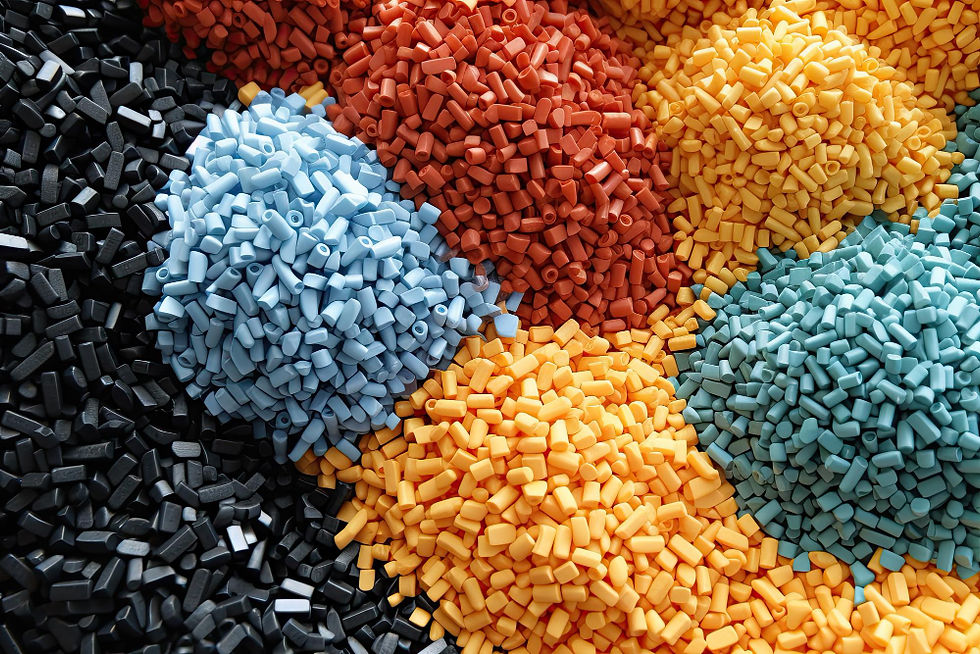How to Choose the Right Material for Your Injection Moulding Project
- Mar 6, 2024
- 3 min read
Selecting the perfect material for an injection moulding project is akin to picking the right foundation for a building—it's crucial for the success and longevity of your product. With the vast array of plastic materials available, each possessing unique properties, strengths and weaknesses, navigating through the options can be a complex task. This blog from the Amey Plastics team aims to demystify the process, offering a step-by-step guide to help you choose the most suitable material for your injection moulding needs.
Understanding Plastic Material Properties
The first step in selecting a material is understanding the basic properties of plastics, which can significantly impact the performance and durability of your final product. These properties include:
Strength and Durability: This measures how well the material can withstand physical stress or forces without breaking or deforming. Materials such as polycarbonate are known for their high strength and are suitable for products requiring impact resistance.
Flexibility: Some applications may require materials that can bend or stretch. Polyethylene, for example, offers excellent flexibility.
Heat Resistance: If your product will be exposed to high temperatures, choosing a material that can maintain its properties under heat is vital. Polypropylene is a good choice for heat-resistant applications.
Chemical Resistance: Products exposed to chemicals or solvents need materials that won't degrade easily. PTFE (Teflon) is highly resistant to chemicals.
Cost: The price of materials can vary widely, and selecting a material that fits your budget while meeting your product requirements is essential.
Consider the Application of the Product
The intended use of your product is a critical factor in material selection. For instance, consumer products that come into contact with skin may require safe, non-toxic materials like certain grades of polyethylene. Automotive components might need materials that can withstand high temperatures and physical stress, such as nylon or ABS. Medical devices often require highly durable and sterilizable materials like polycarbonate or PEEK.
Factor in Environmental Conditions
The environment in which your product will operate dictates your material choice. For outdoor applications, UV-resistant materials like ASA (Acrylonitrile Styrene Acrylate) can prevent sun damage. For products used in high-temperature environments, materials with excellent heat resistance are paramount. Additionally, if your product will be exposed to chemicals, oils, or solvents, selecting a material with appropriate chemical resistance is crucial.
Evaluate Material Cost and Availability
While performance and suitability are paramount, cost and availability also play significant roles in material selection. Some high-performance materials may be cost-prohibitive for large-scale production or may have longer lead times that could delay your project. It's important to strike a balance between material performance and cost efficiency, ensuring the chosen material is readily available to meet your production schedule.
Consult with Experts
Perhaps one of the most valuable steps in choosing the right material is consulting with experts. Material scientists can offer in-depth insights into the properties and long-term performance of various plastics. Injection moulding professionals, like our Amey Plastics team, can provide practical advice on the manufacturability of your product with different materials, considering factors like shrinkage, warpage and cycle times.
Make an Informed Plastic Material Decision for your Project
The journey to selecting the right material for your injection moulding project doesn't have to be a solo venture. By understanding the fundamental properties of plastic materials, considering the product application and environmental conditions, evaluating cost and availability, and leveraging expert advice, you can make an informed decision that ensures the success and durability of your product.
Remember, the best material choice is one that meets your product's technical requirements, aligns with your budget, and is available within your project timeline. Don't shy away from experimenting with different materials and seeking professional guidance to find the perfect match for your injection moulding needs.
As always, at Amey Plastics we are here to help you navigate this dynamic industry, providing you with the guidance and expertise you need to help make the right decision for your project. To discuss your requirements or for any inquiries about plastic manufacturing, contact the Amey Plastics team at 01730 266525 or email us at sales@ameyplasticsltd.co.uk.




Comments